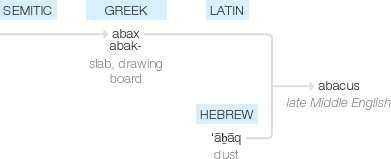Abacus
late Middle English (denoting a board strewn with sand on which to draw figures): from Latin, from Greek abax, abak- ‘slab, drawing board’, of Semitic origin; probably related to Hebrew 'āḇāq ‘dust’.
wiktionary
From Late Middle English abacus, abagus, agabus(“abacus; art of counting with an abacus”), from Latin abacus, abax(“sideboard or table with a slab at the top; slab at the top of a column; counting board, sand table; board for playing games”) (compare Late Latin abacus(“art of arithmetic”)), from Ancient Greek ἄβαξ(ábax, “counting board; board covered with sand for drawing; plate; dice-board”). Doublet of abaque.
The plural form abaci is reinforced from Latin abacī.
etymonline
abacus (n.)
late 14c., "sand table for drawing, calculating, etc.," also "art of calculating with an abacus," from Latin abacus, from Greek abax (genitive abakos) "counting table, board for drawing," of uncertain etymology. It is said to be from a Semitic source, Phoenician or Hebrew abaq "sand strewn on a surface for writing," literally "dust," from the Semitic root a-b-q "to fly off," but Beekes and others find this "semantically weak."
Originally a drawing board covered with dust or sand on which mathematical equations or calculations could be traced and erased. In reference to the other type of abacus, a counting frame with beads or balls strung on wires or rods, it is attested from 17c. or later in English. Both types were known in antiquity across Eurasia. Related: Abacist (late 14c.)
